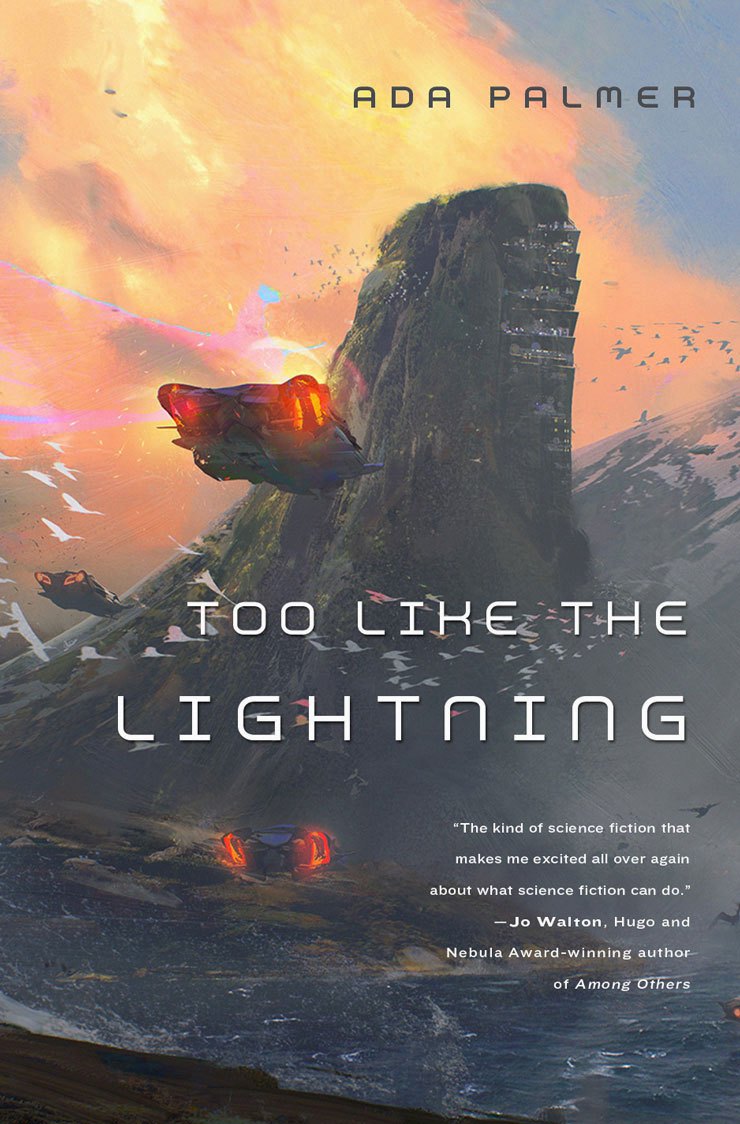I reread this book for the SFFBookClub this month.
Personally, I deeply enjoyed this book and series, but I think it is not for everybody. I highly recommend folks read the first two chapters online here to get a taste of the voice: www.tor.com/2016/04/12/excerpts-ada-palmer-too-like-the-lightning-chapters-1-and-2/. Mycroft the narrator is self-deprecating, frequently addresses the reader, and is most definitely a very unreliable (and heavily edited) narrator. You can read it in the link above, but never ever have I ever seen a book do so much world-building via content warnings.
This book (and series) is trying to do so much, and regardless of whether you feel like it worked or not, it's hard not to be in awe of the ambition and the sheer density of ideas threaded together here. In the first chapter we've got flying cars, a secret magic kid who can turn toys into real life, mention of a Church War and sensayers (religious therapists) in the wake of it, Mycroft letting the reader know that he's misgendering everybody for ~reasons~, legal punishment alternatives in a Servicer system, questions about free will, and alternative family structures called bashes. This is before we get into 18th century philosophy, ethics, religion, and Greek myth. FOOF
This book is really catnip for me even on a reread; I find Mycroft to be extremely engaging as a narrator, and I appreciate so much how all of these details are spooled out at just the right pace to keep me intrigued but not overwhelmed. It felt like each chapter was carefully crafted to introduce a new location, bring in some world details and history, focus on a slightly different set of world leaders, and push the mystery investigation of the 7-10 list theft forward. It never felt like too much, and I constantly hungered to find out more about the world.
I talked about this after reading Infomocracy for SFFBookClub, but I really appreciated how much flying cars in this story drove so many social changes. If people can be flown across the globe in a few hours, then borders lose meaning. And if borders lose meaning, then what does that mean for governments that are based on geography. Clearly, the hive system is not meant to be posited as some ideal government solution, but for me at least there's something idealistic and positive about the idea of people being able to (more) freely choose their own laws and government in ways that aren't constrained by the power of geography.
I enjoyed the rest of the series as well, but I feel like the first two books are by far the strongest for me as a reader. The final two books are no longer an edited history and so Mycroft becomes even more of an unreliable narrator (if such a thing is possible) and the fourth book goes off on some epic :drum: diversions. I enjoyed the final two books a lot (and the ending lands SO well) but in some ways it wanders much more philosophically and is not as tight of a story as the first two books for me.
Unsurprisingly, I have a bunch of gender thoughts on this book too, which I'm going to put separately, because there's a lot of them: books.theunseen.city/user/picklish/status/87074



